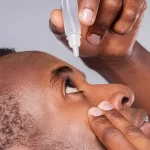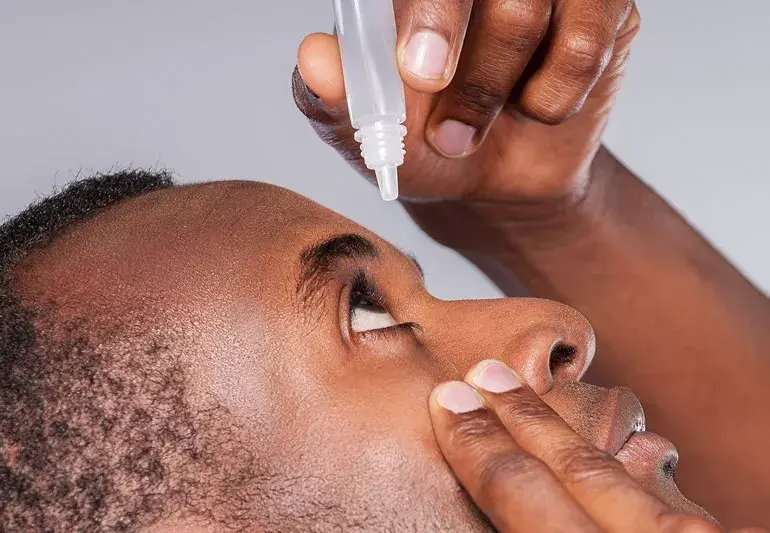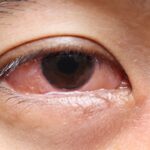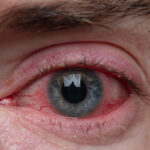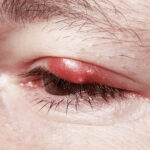How to Reduce Itchy Eye
Regarding this article on how to reduce itchy eye, it is important to understand that the problem often begins as a mild, irritating itch that makes you want to rub or wipe your eyes, hoping for some relief. But before long, the discomfort intensifies. Suddenly, you’re facing swollen, red, and itchy eyes that seem to burn all day long, no matter what you try.
If you’re also noticing pain, discharge, light sensitivity, or a gritty sensation in your eyes, it could be a sign of an eye infection. However, if your eyes are swollen, puffy, dry, and persistently itchy with a burning sensation, it’s more likely you’re dealing with severe allergies.
Causes of Itchy Eyes
Several medical conditions and external factors can lead to itchy eyes, often accompanied by other symptoms. These conditions vary in severity and may require different treatment approaches. Here are some key causes:
- Atopic Keratoconjunctivitis (AKC)
Atopic keratoconjunctivitis is a condition characterized by inflammation of both the cornea and conjunctiva (the membrane covering the front of the eye). People with AKC are genetically predisposed to allergic reactions and tend to produce higher-than-normal levels of antibodies in response to allergens. This condition can affect individuals year-round if left untreated. It may result in serious complications, including:
-
- Ulcers
- Scarring
- Cataracts
- Keratoconus (thinning of the cornea causing a cone-shaped bulge)
- Corneal vascularization (growth of blood vessels into the cornea)
- Vernal Keratoconjunctivitis (VKC)
Vernal keratoconjunctivitis is another inflammatory condition of the conjunctiva, often affecting young boys. Those with VKC may experience large, hard, cobblestone-like bumps on the upper eyelid. While commonly seasonal, some individuals suffer from VKC year-round, which can lead to corneal ulcers and scarring if severe.
- Allergic Conjunctivitis
Allergic conjunctivitis occurs when the eye’s inner membrane becomes irritated due to allergens such as:
-
- Pollen
- Mold
- Grass
- Weeds
- Pet dander
- Dust and dust mites
- Irritants like makeup, lotions, or contact lens solution
- Atopic Dermatitis
This form of eczema results in dry, scaly patches on the skin, which can also affect the area around the eyes, leading to itching and irritation.
- Dry Eye Syndrome
Dry eyes occur when the eyes lack sufficient moisture and lubrication, leaving them more vulnerable to dust and airborne particles. This can cause inflammation, scarring, and discomfort.
- Meibomian Gland Dysfunction (MGD)
The Meibomian glands, located in the eyelids, are responsible for secreting oil that prevents tears from evaporating too quickly. When these glands become blocked or abnormal, they fail to maintain eye moisture, leading to dry eyes.
- Blepharitis
Blepharitis causes inflammation of the eyelids, often triggered by bacterial infections (like Staphylococcus) or eyelid mites. This condition can lead to swollen, itchy, and irritated eyes. - Contact Lens-Induced Conjunctivitis
Contact lens wearers can develop eye infections or damage the cornea, leading to conjunctivitis or scarring.
- Giant Papillary Conjunctivitis
Often related to an allergic reaction, this condition presents as large bumps under the eyelids. Causes include:
-
- Vernal keratoconjunctivitis
- Atopic keratoconjunctivitis
- Contact lens use
- Artificial eye use
- Exposed sutures
- Infectious Conjunctivitis
Both bacterial and viral infections can cause conjunctivitis. Common bacteria include:
-
- Neisseria gonorrhoeae
- Neisseria meningitides
- Streptococcus pneumoniae
- Haemophilus influenza
- Staphylococcus aureus
- Chlamydia trachomatis
Viral infections, such as those caused by adenovirus, herpes simplex, and herpes zoster, are also common.
- Medication Side Effects
Certain medications can contribute to dry eyes or eye problems, including:- Birth control pills
- Certain antibiotics like penicillin
- Over-the-counter pain medications (e.g., ibuprofen, acetaminophen)
- Decongestants and antihistamines
- Beta-blockers
- Antidepressants
- Artificial tears
- Some acne medications
Managing and Treating Itchy Eyes
If you suspect any of the above conditions, it’s important to seek medical advice to address the underlying cause and prevent complications. Depending on the condition, treatments may range from eye drops and medications to more specialized therapies.
Ophthalmologist Nicole Bajic, MD, offers a range of simple remedies you can try at home to ease the discomfort and bring relief to your allergy-affected eyes. These steps can help soothe the irritation and give your eyes the break they need.
How to Find Relief from Eye Allergies
Allergic rhinitis, commonly known as hay fever, often brings with it an array of unpleasant symptoms, such as:
- Runny nose
- Nasal congestion
- Sneezing
- Swollen, watery eyes
- Itchy nose, ears, eyes, throat, and/or mouth
While some people suffer from these symptoms year-round, others experience them only during specific seasons. No matter when allergies strike, one of the most bothersome symptoms is the irritation they cause to your sensitive, vulnerable eyes.
As Dr. Nicole Bajic explains, “During allergy season, eyes that are prone to allergies often become itchy and irritated because of exposure to common triggers such as tree pollen, grass, mold, and ragweed, which accompany seasonal changes.”
While starting allergy medications early—before allergy season begins—is one way to prevent these symptoms, it’s not always possible. For those caught off guard by allergy flare-ups, there are several home remedies that can help bring relief.
- Use Eye Drops
While it may seem obvious to reach for over-the-counter eye drops, it’s important to choose the right type. Different eye drops are designed for different issues:
- Artificial tears: These help lubricate dry eyes and offer relief from mild irritation.
- Redness-reducing drops: These target blood vessels to minimize the appearance of red eyes.
- Allergy eye drops: These are what you’ll want to use for allergies. They work by blocking your body’s histamine response and addressing the three main symptoms of allergy-affected eyes: dryness, redness, and itchiness.
Dr. Bajic advises that allergy sufferers get the best results by using allergy drops consistently, ideally starting them every morning before symptoms become severe.
- Try a Cold Compress
If your eyes remain itchy even after using eye drops, or if you’re seeking relief at the end of a long day, try applying a cold compress. A damp, cold washcloth placed over your eyes can help reduce swelling and irritation by limiting blood flow to the area.
This simple remedy can be especially soothing when you’re winding down in the evening and looking for quick, last-minute relief.
By using these remedies and taking preventive measures, you can make allergy season more bearable for your eyes and keep discomfort at bay.
- Take a Shower Before Bed
Your hair, eyelashes, eyebrows, and even your eyelids act like tiny collectors, gathering pollen and allergens as you go about your day.
By taking a shower before bed, you can remove these allergens and prevent them from being transferred to your bedding, ensuring that the place you sleep is a safe haven. This simple act can give your eyes a much-needed break during the night when they’re often the most irritated.
As Dr. Bajic explains, “Reducing your exposure to allergens as much as possible can significantly decrease the severity of your symptoms.”
- Change Your Bedding More Frequently
Washing your bedding in hot water once a week might feel like a lot of work, but it can drastically reduce your exposure to allergens such as dust, pollen, mold, and pet dander. These allergens can accumulate in your sheets and pillowcases over time, aggravating your allergies, particularly when you sleep.
In addition to changing your bedding regularly, consider changing your clothes when you come home after being outside and washing them throughout the week to minimize allergen buildup.
- Close the Windows in Your Car and Home
Think of managing allergies similarly to how you approach sun protection: a little year-round vigilance goes a long way. However, during peak allergy seasons, extra precautions are beneficial.
Keeping your car windows closed while driving and your home windows shut—especially during sudden weather changes—can help limit exposure to airborne allergens like grass or tree pollen. Wearing sunglasses outdoors can also reduce pollen exposure to your eyes, providing additional protection.
- Use an Air Purifier
An air purifier can be an excellent tool for controlling allergens in your home. Beyond reducing allergens, research has shown that air purifiers can improve conditions like asthma and positively affect overall health by improving lung function, heart rate, and even blood pressure.
Adding one to your home, especially in your bedroom or living spaces, can help make breathing easier and provide much-needed relief during allergy season.
- Avoid Rubbing Your Itchy Eyes
Although rubbing your eyes may seem like a natural response to alleviate discomfort, it’s important to resist the urge as much as possible. Touching your eyes, especially with hands or clothes that may have pollen or other allergens on them, can make your symptoms worse.
Not only can rubbing your eyes transfer additional allergens, but it also increases the risk of introducing bacteria that could lead to infections.
Moreover, excessive rubbing can cause damage to the delicate surface of your eye, like scratching your cornea, which can result in severe pain and further complications. Frequent rubbing may also lead to a condition called mucus fishing syndrome, where the eyes overproduce mucus in response to irritation, causing a repetitive cycle of wiping and irritation.
SEE ALSO: Foods To Fight Infections
The takeaway? Avoid rubbing your eyes, and if home remedies aren’t providing enough relief, it’s a good idea to consult a healthcare provider. They can evaluate your condition and suggest the best course of treatment for your eye allergies.
When to See a Doctor for Eye Problems
Eye issues can sometimes be a sign of a more serious condition, requiring a prompt medical evaluation. In certain situations, immediate attention from an eye doctor, or even a visit to the emergency room, is necessary. The Wills Eye Hospital recommends seeking urgent medical care if you experience any of the following symptoms:
- Severe eye pain
- Sudden vision loss
- Eye redness accompanied by pain
- Visual disturbances, such as:
- Seeing circles or halos around lights
- Seeing shadows, cobweb-like shapes, or strings
- Sudden blurred vision
- Double vision
- Sudden onset of crossed eyes or appearance of a wandering eye
- Eye bulging
- Eye swelling
- Signs of infection, such as:
- Crusting around the eyes
- Discharge from the eyes
- Excessive tearing
- Eyelids sticking together, especially after waking up
If any of these symptoms appear, it is crucial to get a professional evaluation as soon as possible to prevent any potential damage to your vision or overall eye health.
Treatments for Itchy Eyes
The treatment for itchy eyes varies depending on the underlying cause. Common treatment options include:
- Identifying and avoiding the cause: Pinpointing and minimizing exposure to allergens or irritants is key.
- Applying cool or warm compresses: A cool compress can relieve inflammation, while a warm compress can help with issues like blocked oil glands.
- Maintaining good eye hygiene: Cleaning the eyes regularly helps prevent infections or irritation.
- Discontinuing or switching contact lenses: Stopping lens use or switching to a different type can reduce irritation.
- Regulating air temperature and moisture: Using a humidifier or controlling air conditioning can help prevent dry eyes.
- Using artificial tears: Over-the-counter artificial tears can help with lubrication and soothe dryness.
- Cleaning the eye with a saltwater solution: This can flush out irritants and allergens.
- Taking antibiotics or other medications: If an infection is present, antibiotics or antiviral medications may be prescribed.
- Using over-the-counter decongestants: These can help reduce swelling and redness in the eyes.
- Combining decongestants and antihistamines: For allergy-related issues, this combination can relieve symptoms like itching and swelling.
- Using medications to increase tear production: Certain prescription eye drops can stimulate tear production for dry eye syndrome.
- Taking oral or nasal antihistamines and mast-cell stabilizers: These can reduce allergic responses.
- Steroid injections above the eyelid: In severe cases, a healthcare provider may recommend steroid injections to reduce inflammation.
The appropriate treatment will be determined by a healthcare provider based on the specific condition and the individual’s medical history.
Prevention of Itchy Eyes
Preventing itchy eyes largely depends on identifying the underlying cause, but there are several general strategies to promote good eye health and reduce the frequency of symptoms:
- Use a humidifier: In dry environments or during winter, adding moisture to the air can help prevent dry eyes.
- Maintain humidifier cleanliness: Regularly clean humidifiers and consider using a HEPA filter to purify the air.
- Change air filters regularly: Replacing filters in heating and cooling systems helps reduce airborne allergens.
- Avoid eye rubbing: Rubbing can worsen irritation and introduce bacteria. Instead, apply a cool compress for relief.
- Stay away from smoke and scented candles: Smoke and scented products can irritate the eyes.
- Choose hypoallergenic products: Only use hypoallergenic makeup, lotions, or other products near the eyes.
- Eat a healthy diet: A diet rich in vitamin A and omega-3 fatty acids supports eye health.
- Stay indoors when pollen levels are high: For those with allergies, limiting exposure to pollen can reduce symptoms.
- Wear eye protection: Use safety glasses when working in dusty or windy environments. Sunglasses can also provide protection from sun and wind exposure.
- Avoid strong odors: Chemicals, perfumes, and even certain foods like onions can irritate the eyes, so try to limit exposure where possible.
By following these preventive measures, individuals can help reduce the risk of developing itchy eyes or worsening existing symptoms. Always consult a healthcare provider for personalized advice.
What are the pros and cons of a vegan diet?
How Do You Feel When Your Sugar Is Low?
Benefits of Cloves to The Vagina

A graduate of Computer Science and Information Management Technology. Diploma – Caregiving, Certificates – Dementia and Diabetes Awareness and Management. A researcher, blogger, songwriter, singer and acoustic guitarist. Born in an environment where natural talents such as healing are imparted at our natural birth. This natural talents of healing is the result of our genetic inheritance and the training from family environment.





